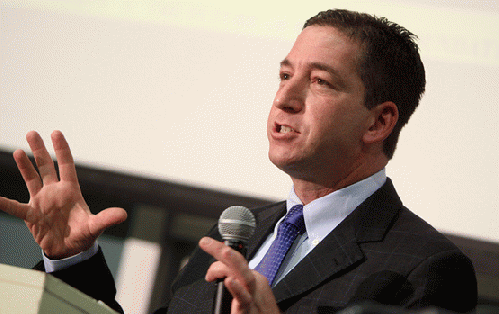Original posted here

Glenn Greenwald speaks at Young Americans for Liberty's Civil Liberties tour at the University of Arizona in Tucson, Ariz.
(Image by Photo by Gage Skidmore / Flickr.) Details DMCA
One year ago, Edward Snowden was thrust upon the world stage when he began revealing what he called widespread violations of civil liberties by a growing "surveillance state."
Glenn Greenwald, one of the three reporters who broke those stories -- which won the Pulitzer Prize for public affairs reporting, the Polk Award for national security reporting, and the top award for investigative journalism from the Online News Association -- has just published a book about his experiences: No Place To Hide: Edward Snowden, the NSA and the U.S. Surveillance State.
Greenwald found time during his current book tour to speak with YES! Executive Editor Dean Paton -- about government threats to his reporting, as well as what citizens can do to protect and bolster civil liberties in the digital age. Their conversation has been lightly edited.
Paton: I thought I'd start by asking whether you felt apprehensive about coming back to your home country from your current home in Brazil, after all that's been said about you by government officials and members of Congress.
Greenwald: Sure. They had deliberately cultivated this climate where they wanted us to be concerned that if we came back -- myself and Laura Poitras in particular -- there was a substantial chance that we would be arrested. We had top-level Obama officials and the chairman of the house intelligence committee Mike Rogers overtly calling us criminals and saying that what we were doing ought to be subject to prosecution. And we had lawyers who were trying to obtain guarantees that we could safely return to the U.S. and the officials simply wouldn't provide them because they wanted us to be in this state of uncertainty.
So we did come back more for the principle than anything else. We weren't going to be forced out of our own country for doing journalism, but it was definitely risky and apprehensive when we returned.
Paton: Why do you think they wanted you to feel that apprehension?
Greenwald: They know that we have this massive archive of documents that they can't physically prevent us from publishing. And they want us to be in a state of fear, that each time we publish a certain document they don't want published, it could be the difference between them not prosecuting us and prosecuting us. They are essentially using intimidation and the threat of prosecution to try and stifle and censor the reporting. And the more fearless we are, the more they think we'll publish. The more fearful we are, the more they hope we'll self-censor.
Paton: What's your sense of how much they've already been spying, or, you know, eavesdropping -- whatever term you want to use -- on Americans engaged in lawful activity?
Greenwald: That's part of the reporting that we're working on now. I mean, of course, just the collection of metadata by itself, which they're doing on everybody, is itself its own form of invasive surveillance -- which is suspicion-less and indiscriminate. If you're an American citizen, then if they want to target you for surveillance they're supposed to have to go to the Foreign Intelligence Surveillance Court.
But of course the FISA court is really no oversight at all because it rubber-stamps virtually everything the government asks it to do. And in its 35-year history, they've approved in excess of 35,000 requests for surveillance, and have rejected a grand total of 12. So it really is no form of guarantee or safeguard at all.
And then if you are an American talking to one of their foreign targets, they can actually read your emails and listen to your telephone conversations without any warrant at all. But one of the big questions that remains in this reporting that we're working on now is: Who exactly, domestically, are they targeting? What kinds of people are these? Are these really terrorists or national security threats? Or are they more like foreign-policy critics and professors and authors and the like -- people who've historically been targeted in surveillance abuses? And that's the question we intend for our reporting to answer.
Paton: Are you considered a national security threat by the FISA court or by the NSA?
Greenwald: [Laughs] I mean, it's possible. Of course, the FISA court conducts itself and its procedures completely in the dark, so no one has any idea who has been targeted or exactly how the process works. What I do know is that when my partner sued the British government claiming that his detention under the Terrorism Act at Heathrow airport for 11 hours was illegal, the British government, to justify why they detained him, filed documents making very clear that they were surveilling his communications, mine, and/or my colleagues at The Guardian.
So even if the U.S. government can't target its own citizens, they often have partners in their surveillance alliance do it for them. And so, I think the protections are more illusory and symbolic than anything else.
(Note: You can view every article as one long page if you sign up as an Advocate Member, or higher).




